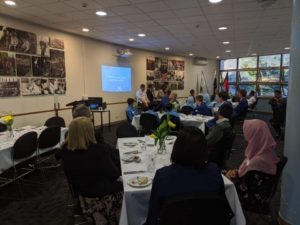Last Friday night St Edmund’s hosted an Interfaith dinner with the Islamic School of Canberra. This was the first time that the College has participated in a night like this and this was a great opportunity for both communities to come together and share their thoughts on the theme of peace. Father Dan Benedetti the St Edmund’s College Chaplain (MGL Priest) shared along with Imam Adan Konda Chaplain of ISC their responses to the following questions with attendees on the night in a Question and Answer panel format;
- What does peace mean in your religion?
- How does your sacred text refer to peace and practice?
- What can we do to promote peace and what are the challenges in our contemporary society?
Both religious leaders shared some great examples of role models who have lived a peaceful existence, spoke to anecdotes where peace has healed communities and outlined how God can assist us in striving for peace in daily life with his guidance.
At the beginning of the night Patrick MacFarlane our Faith and Mission Captain for 2020 read a verse from the Bible on peace and then read the following passage to guests.
“Now may the Lord of peace himself give you peace at all times in every way. The Lord be with you all.” 2 Thessalonians 3:16
The Hebrew word for “peace,” shalom, is often used in reference to an appearance of calm and tranquility of individuals, groups, and nations. The Greek word eirene means “unity and accord”; St Paul uses eirene to describe the task of the church in the New Testament. But the deeper, more foundational meaning of peace is “the spiritual harmony brought about by an individual’s restoration with God.”
In the verse I read, St Paul appeals to the Lord, who is the source of peace to grant His peace to the church at Thessalonica. The church was experiencing trials, persecution, and trouble within and the Lord’s peace could bring calm upon the congregation.
Paul does not pray only for the Lord’s peace to be with the community but also for the “Lord of peace” to be with them. Further, he prays for this peace to be with “all” the believers at Thessalonica.
A peaceful church experiences the Lord’s joy as well as His peace and so it can then also be a clear beacon of God’s presence and hope for the community.
We understand peace to be something achievable but also something embodied by God. Of course, this peace was made incarnate through Jesus Christ. Christ is often referred to as ‘Prince of Peace’. This is because it was His sacrifice that provided eternal peace- allowing a full relationship to be restored with God. This peace is needed because as humans we have flaws- we are sinful. God calls us to live with humility, gentleness and patience – and this would not be possible without the work of the Holy Spirit in us and the peace we can have with God thanks to the sacrifice of his son.
Peace in the Christian context is about restoring and maintaining a relationship with God. Something achieved through faith in Christ and in our actions for others.
Patricks reading was then followed by an ISC student who shared this verse from the Quran and then explained what it means for her in her religion.
“And when come to you those who believe in Our Verses then say, “Peace (be) upon you. Your Lord has prescribed upon Himself Mercy.”
A big thankyou to our wonderful Hospitality team led by Mrs Rebecca Jarmin and Mr Alex Hausen who prepared a beautiful three course meal for all who attended and helped setup and pack away the function. This service by our students was first rate and these students should be acknowledged and thanked for their ongoing support of College functions. Please read menu below.
Interfaith Dinner Menu
Entree:
- Freekeh & Cauliflower salad with herb dressing • Red lentil soup with yoghurt and coriander
Main Course:
- Honey mustard chicken on celeriac mash • Beef paprika with sour cream and crisp onion
Dessert:
- Anzac biscuit ice-cream sandwich
- Anzac biscuit puddingr
Michael Monagle (Assistant Principal – Mission and Identity)

